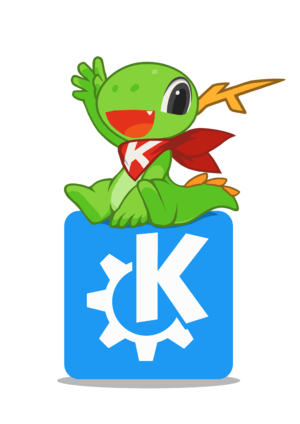Incubator: Difference between revisions
Thiagosueto (talk | contribs) m (Minor corrections and spacing between blocks of content) |
No edit summary |
||
| (2 intermediate revisions by one other user not shown) | |||
| Line 1: | Line 1: | ||
[[File:Mascot konqi-dev-kde.png|thumbnail|right|[[Konqi]] welcomes you to KDE project!]] | [[File:Mascot konqi-dev-kde.png|thumbnail|right|[[Konqi]] welcomes you to KDE project!]] | ||
Welcome to the home page of the KDE Incubator. | Welcome to the home page of the KDE Incubator! | ||
There are many benefits to becoming a KDE project: https://manifesto.kde.org/benefits.html | |||
⇝ [[Incubator/Incubated Projects|List of currently incubated projects]]. | |||
== Requirements == | |||
* [http:// | * Compliance with the [http://manifesto.kde.org KDE Manifesto] | ||
* | * Governance similar to the other KDE projects | ||
* Clear product vision | |||
* Healthy team (healthy proportion of volunteers, inclusive towards new contributors, ideally more than one developer) | |||
* Uses English for code and communication | |||
* Continuity agreement must be in place with KDE e.V. for domains and trademarks if the authors disappear | |||
* Recommended to attend [[Akademy]] | |||
== Process == | |||
=== Candidate === | |||
First, send an email to [email protected] requesting a sponsor. This email must provide a description of the project to be incubated, include a list of the people committing to the project, and have a plan to be in compliance with the [https://manifesto.kde.org/index.html KDE manifesto]. For example, it must be hosted using Free Software tools (e.g. not on Github). | |||
=== Incubating === | |||
During this phase, the sponsor actively works toward getting the project set up by Making sure the needed infrastructure is provided by the community (lives in our current playground area) and Verifying that the process is going in the right direction and not getting stalled. | |||
During this phase, the project cannot yet use the KDE brand or have a top level website on kde.org. If project becomes stalled or does not conform to the manifesto, it gets archived (see below). | |||
=== Active === | |||
During the Active phase, the project enters "KDEReview" and follows the process from there (see also [[Policies/Application_Lifecycle|Application Lifecycle]] and [[KDEReview]]. The project team is assumed and expected to behave like other KDE teams and respect the KDE manifesto. | |||
=== Stalled & Archived === | |||
A project is considered stalled when for one year, there is no release, no commits, and no mailing-list activity. Current maintainers are contacted to check what's happening. If there is no activity or no reply from existing maintainers, after a month then a call to new maintainers is done. If a new maintainer shows up he or she gets a six month trial. If after a month no new maintainer showed up, the project gets archived. | |||
When a project gets archived, the source repo gets closed, the mailing list disabled, and only last download is available. If someone wants to pick it up, it goes back to the candidate phase. | |||
=== Notes === | |||
Here are [[Incubator/Notes|notes]] which led to the current process. | |||
Revision as of 19:25, 10 October 2019

Welcome to the home page of the KDE Incubator! There are many benefits to becoming a KDE project: https://manifesto.kde.org/benefits.html
⇝ List of currently incubated projects.
Requirements
- Compliance with the KDE Manifesto
- Governance similar to the other KDE projects
- Clear product vision
- Healthy team (healthy proportion of volunteers, inclusive towards new contributors, ideally more than one developer)
- Uses English for code and communication
- Continuity agreement must be in place with KDE e.V. for domains and trademarks if the authors disappear
- Recommended to attend Akademy
Process
Candidate
First, send an email to [email protected] requesting a sponsor. This email must provide a description of the project to be incubated, include a list of the people committing to the project, and have a plan to be in compliance with the KDE manifesto. For example, it must be hosted using Free Software tools (e.g. not on Github).
Incubating
During this phase, the sponsor actively works toward getting the project set up by Making sure the needed infrastructure is provided by the community (lives in our current playground area) and Verifying that the process is going in the right direction and not getting stalled.
During this phase, the project cannot yet use the KDE brand or have a top level website on kde.org. If project becomes stalled or does not conform to the manifesto, it gets archived (see below).
Active
During the Active phase, the project enters "KDEReview" and follows the process from there (see also Application Lifecycle and KDEReview. The project team is assumed and expected to behave like other KDE teams and respect the KDE manifesto.
Stalled & Archived
A project is considered stalled when for one year, there is no release, no commits, and no mailing-list activity. Current maintainers are contacted to check what's happening. If there is no activity or no reply from existing maintainers, after a month then a call to new maintainers is done. If a new maintainer shows up he or she gets a six month trial. If after a month no new maintainer showed up, the project gets archived.
When a project gets archived, the source repo gets closed, the mailing list disabled, and only last download is available. If someone wants to pick it up, it goes back to the candidate phase.
Notes
Here are notes which led to the current process.
